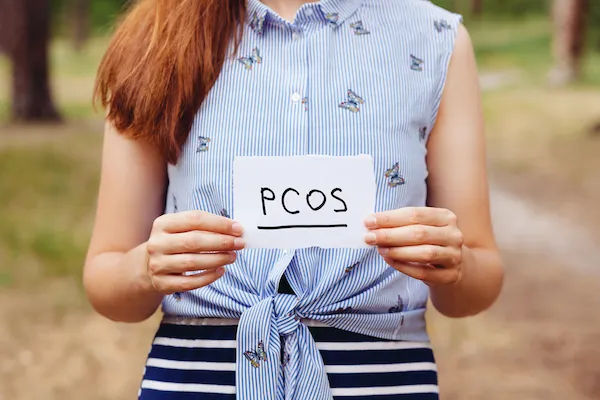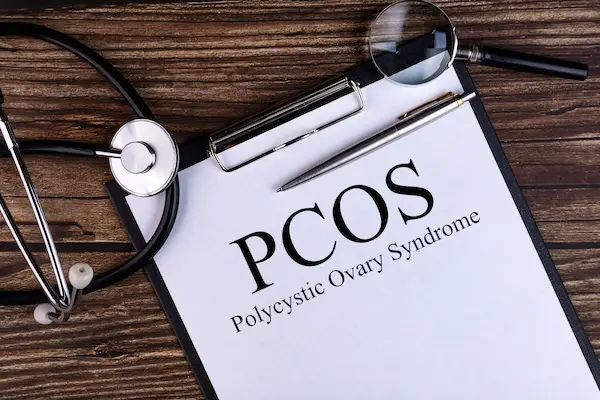Polycystic Ovary Syndrome: Symptoms, Causes, and Management
Understand polycystic ovary syndrome (PCOS), its symptoms, causes, and management options. Learn how timely care can improve health and fertility.


Introduction
Polycystic Ovary Syndrome, commonly known as PCOS, is one of the most prevalent hormonal disorders affecting people with ovaries during their reproductive years. Affecting an estimated 1 in 10 women, it's a complex condition that often goes undiagnosed, leaving many to struggle with confusing and frustrating symptoms alone. PCOS is more than just a reproductive issue; it's a metabolic disorder that can impact your entire body, from your weight and skin to your long-term health. This guide will demystify PCOS, breaking down its common signs, underlying causes, and the most effective strategies for diagnosis and management. If you've been dealing with irregular periods, unexplained weight gain, or other concerning symptoms, understanding this syndrome is your first step toward taking control of your health.
What is Polycystic Ovary Syndrome (PCOS)?
Polycystic Ovary Syndrome (PCOS) is a hormonal disorder characterised by a combination of symptoms that result from imbalances in reproductive hormones. The name itself can be misleading. While "polycystic" means "many cysts," not everyone with PCOS actually has cysts on their ovaries. The core issue is a hormonal imbalance where the ovaries produce excess androgens (male hormones), which disrupts the regular menstrual cycle and ovulation.
Beyond the Ovaries: A Whole-Body Condition
It's crucial to understand that PCOS is a systemic condition. The hormonal irregularities, particularly insulin resistance, affect various bodily systems. This is why symptoms can appear in seemingly unrelated areas, such as the skin (acne), scalp (hair loss), and the body's ability to manage weight and blood sugar.
How Common is PCOS?
PCOS is incredibly common, impacting approximately 6% to 12% of women of reproductive age in the U.S. (CDC data), making it a leading cause of female infertility. Despite its prevalence, it can take an average of two years and multiple doctor visits to receive a correct diagnosis, often because symptoms are varied and can be mistaken for other issues.
Consult a Gynaecologist for the best advice
Recognising the Signs: Common PCOS Symptoms
PCOS symptoms can vary widely from person to person in both type and severity. Some may experience only mild signs, while others have more severe manifestations.
Reproductive and Menstrual Symptoms
- Irregular Periods: This is the most common hallmark. This includes periods that are infrequent (fewer than nine per year), irregular, or prolonged.
- Lack of Ovulation: Without a regular cycle, ovulation may not occur, which is the primary reason for PCOS-related infertility.
- Polycystic Ovaries: Enlarged ovaries containing numerous small, fluid-filled follicles that surround the eggs.
Metabolic and Physical Symptoms
Excess Androgen: High levels of male hormones can lead to physical signs like:
- Hirsutism: Excessive facial and body hair (on the chest, stomach, back).
- Severe Acne: Persistent acne on the face, chest, and upper back.
- Male-Pattern Baldness: Thinning hair or hair loss on the scalp.
- Weight Gain: Unexplained weight gain or difficulty losing weight, particularly around the abdomen.
- Acanthosis Nigricans: Dark, velvety patches of skin, often in body folds like the neck, groin, and under the breasts, which is a sign of insulin resistance.
Emotional and Psychological Impact
The physical symptoms often take a significant toll on mental health. Many with PCOS report higher rates of anxiety, depression, poor self-esteem, and negative body image due to the visible nature of their symptoms.
What Causes PCOS? Unraveling the Mystery
The exact cause of PCOS remains unknown, but research points to several key contributing factors that often work in combination.
The Role of Hormonal Imbalance
The central problem is an overproduction of androgens by the ovaries. This excess prevents the ovaries from releasing an egg (ovulation) during each cycle and is directly responsible for symptoms like hirsutism and acne.
Insulin Resistance and Its Effects
Up to 70% of people with PCOS have insulin resistance. This means their body's cells don't respond normally to insulin, causing the pancreas to produce more of it. High insulin levels further increase androgen production, creating a vicious cycle that worsens PCOS symptoms and makes managing PCOS and weight particularly challenging.
The Genetic Link
PCOS often runs in families. If your mother, sister, or aunt has it, you have a higher risk of developing it, suggesting a strong genetic component.
How is PCOS Diagnosed?
There is no single test for PCOS. Diagnosis typically follows the Rotterdam Criteria, where a person must meet at least two of the following three criteria:
1. Irregular or absent periods.
2. Signs of high androgen levels (either through blood tests or physical symptoms like hirsutism).
3. Polycystic ovaries visible on an ultrasound.
Essential Medical Tests and What They Mean
To confirm this, a doctor will:
- Take a detailed medical history.
- Perform a physical exam for signs of excess hair, acne, etc.
- Order blood tests to check androgen levels, cholesterol, blood sugar, and insulin.
- Conduct a pelvic ultrasound to examine the ovaries.
If you suspect you have PCOS, it's crucial to consult a specialist. You can get a preliminary evaluation and discuss your symptoms with a gynaecologist or endocrinologist online via Apollo24|7.
Get Your Health Assessed
Potential Health Complications of PCOS
Untreated PCOS can lead to several serious health conditions, making management critical.
Short-Term Concerns
- Infertility
- Severe acne and psychological distress
- Sleep apnoea
Long-Term Health Risks
- Type 2 Diabetes: Due to insulin resistance.
- Cardiovascular Disease: High blood pressure, high LDL cholesterol.
- Endometrial Hyperplasia and Cancer: Caused by a build-up of the uterine lining without regular periods.
- Depression and Anxiety: Related to both hormonal changes and managing a chronic condition.
Managing PCOS: Treatment and Lifestyle Strategies
While there's no cure for PCOS, its symptoms can be effectively managed through a combination of lifestyle changes and medication.
First-Line Treatment: Diet and Exercise for PCOS
Lifestyle modification is the cornerstone of management.
- Diet: A low-glycemic index (GI) diet rich in whole grains, lean protein, and anti-inflammatory foods can help manage insulin levels.
- Exercise: Regular physical activity (150 minutes per week) helps lower blood sugar and can aid significantly with PCOS and weight loss.
Medications to Regulate Cycles and Symptoms
- Hormonal Birth Control: Pills, patches, or rings can regulate periods and reduce androgen-related symptoms.
- Metformin: A diabetes medication that improves insulin resistance.
- Anti-Androgen Medications: Can reduce hair growth and acne.
Fertility Treatments for PCOS
For those trying to conceive, medications like Clomiphene or Letrozole can induce ovulation. IVF may also be an option.
Mental Health and Emotional Support
Therapy, support groups, and stress-management techniques like yoga and meditation are vital components of a holistic PCOS management plan. If your mood is persistently low, consulting a therapist or psychiatrist is recommended.
Conclusion
Living with Polycystic Ovary Syndrome can feel overwhelming, but it's important to remember that you are not alone, and it is a highly manageable condition. Empowerment comes from knowledge and proactive care. By understanding your body, recognising the symptoms, and partnering with knowledgeable healthcare providers, you can create an effective management plan tailored to your needs. This journey is about more than just treating a syndrome; it's about reclaiming your health and well-being. If you recognise these signs in yourself, take that first step. Consult a doctor online with Apollo24|7 to discuss your concerns and begin the path to a proper diagnosis and a personalised management strategy.
Consult a Gynaecologist for the best advice
Consult a Gynaecologist for the best advice
Dr. Isha Rani
Obstetrician and Gynaecologist
4 Years • MBBS, DNB (Obstetrics & Gynaecology)
Bengaluru
Altius Hospital, Bengaluru

Dr. Parul Sharma
Obstetrician and Gynaecologist
8 Years • MBBS, MS (Obstetrics & Gynaecology)
New Delhi
THE DOCTORS NESST, New Delhi

Dr. Rituparna De
Obstetrician and Gynaecologist
7 Years • MBBS, MS (Obstetrics & Gynaecology)
Kolkata
MCR SUPER SPECIALITY POLY CLINIC & PATHOLOGY, Kolkata

Dr. Sanjan Das
Obstetrician and Gynaecologist
15 Years • MBBS,MS
Bengaluru
Apollo Clinic, Sarjapur Road, Bengaluru

Dr. Pritam Dey
Obstetrician and Gynaecologist
6 Years • MBBS,MS(OBSTETRICS & GYNAECOLOGY),FMAS
Kolkata
Dr. Pritam Dey's Chamber, Kolkata
(50+ Patients)
Consult a Gynaecologist for the best advice
Dr. Isha Rani
Obstetrician and Gynaecologist
4 Years • MBBS, DNB (Obstetrics & Gynaecology)
Bengaluru
Altius Hospital, Bengaluru

Dr. Parul Sharma
Obstetrician and Gynaecologist
8 Years • MBBS, MS (Obstetrics & Gynaecology)
New Delhi
THE DOCTORS NESST, New Delhi

Dr. Rituparna De
Obstetrician and Gynaecologist
7 Years • MBBS, MS (Obstetrics & Gynaecology)
Kolkata
MCR SUPER SPECIALITY POLY CLINIC & PATHOLOGY, Kolkata

Dr. Sanjan Das
Obstetrician and Gynaecologist
15 Years • MBBS,MS
Bengaluru
Apollo Clinic, Sarjapur Road, Bengaluru

Dr. Pritam Dey
Obstetrician and Gynaecologist
6 Years • MBBS,MS(OBSTETRICS & GYNAECOLOGY),FMAS
Kolkata
Dr. Pritam Dey's Chamber, Kolkata
(50+ Patients)
More articles from Pcos
Frequently Asked Questions
Can I get pregnant if I have PCOS?
Yes, absolutely. While PCOS is a leading cause of infertility due to irregular ovulation, it is very treatable. With lifestyle changes, ovulation-inducing medications, and assisted reproductive technologies, many women with PCOS successfully conceive.
What is the difference between PCOD and PCOS?
The terms are often used interchangeably, but some experts use PCOD (Polycystic Ovarian Disease) to refer to a milder condition primarily involving ovarian cysts and irregular periods, while PCOS is considered a more severe metabolic syndrome. However, in most modern medical contexts, PCOS is the standard term.
Does PCOS mean I will definitely get diabetes?
Not definitely, but your risk is significantly higher due to insulin resistance. This is why management through a healthy PCOS diet and regular exercise is crucial to prevent or delay the onset of Type 2 Diabetes.
Will I need to be on medication forever?
Not necessarily. The goal of medication is to manage symptoms and correct imbalances. Some women may need long-term treatment, while others may find that significant lifestyle changes allow them to reduce or discontinue medication under a doctor's guidance.
Are there natural remedies to manage PCOS symptoms?
Some natural approaches can support management. These include inositol supplements (which can improve insulin sensitivity), maintaining a healthy weight, managing stress, and getting enough sleep. However, these should always complement, not replace, the treatment plan advised by your doctor.






.webp)